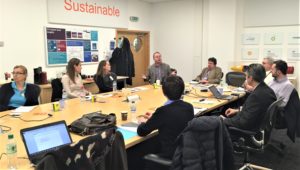
Technical Assistance for Implementation of Civil Society Dialogue and Civil Society Support Programmes (TR2015/DG/01/A5-01/001)
The overall aim of the project is to increase bilateral exchanges and cooperation between CSOs in Turkey and the EU at local, regional and national levels, to promote awareness raising initiatives on importance and benefits of membership of Turkey to the EU within Turkey and EU and on

Increasing Competitiveness of Middle Black Sea Region TR83
Turkey’s Middle Black Sea region was set up in 2009 and is now well established; the Middle Black Sea Region Development Agency (OKA) carries out activities to support the economic and social development of Amasya, Çorum, Samsun and Tokat provinces. The main objective of this project was to

Civil Society Facility 2018 – Sivil Düşün IV
This project is the fourth phase of the Sivil Düşün (‘Think Civil’ in English) programme, which is being funded under the Civil Society Facility of Turkey. The ‘Sivil Düşün’ programme is designed to strengthen the structures and values of participatory democracy. It supports activities that strive to contribute

Consultancy Services for Feasibility Study and Needs Analysis Related with an ‘Environment and Efficiency Centre’ within TOBB structures
An initiative that served to strengthen energy efficiency practices and renewable energy strategies of the private sector was to be of great importance to support private sector institutions in this regard. The project aimed to support Energy Efficiency practices and renewable Energy strategies of the private sector in

Enhancing the Employability of Youth and Unemployed/Low-Skilled Workers, and Improving Their Transition to Employment In Egypt
It can be claimed that advancing the structure and performance of the TVET (Technical and Vocational Education and Training) system and TVET deliveries is essential to better respond to new socio-economic needs, in particular, youth employability and increased competitiveness in the context of the country’s current and future

Technical Assistance for Samsun Logistics Centre
The project was conceived, Turkey’s logistics network ranked 30th worldwide but offered much potential for improvement. With its strategic Black Sea location, seaports, airport and access to national rail and road networks, the Turkish city of Samsun was viewed as being in an excellent position to create a

